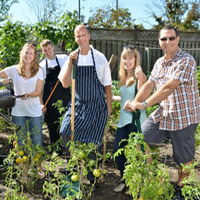TORONTO — What better time to showcase the bounty of the season than September? And, when that bounty comes from your garden and supplies your two restaurants, it brings new meaning to the term farm-to-fork. That’s the case for Tony Loschiavo, owner and founder of Toronto’s Paese Ristorante, L-Eat Catering and L-Eat Express in Toronto, who recently invited media to sample a selection of vegetables and fruits from his urban paradise.
The result was a sumptuous lunch served in the garden, where well-appointed tables were assembled on the patio and media was treated to a bagna cauda (a warm garlicky dip mated to fresh vegetables); fresh Ontario trout smoked on site; and chicken stuffed, wrapped and cooked inside paper-thin dough. The meal was capped by a frozen lemon soufflé with a cucumber mint gelée and a pistachio sable with a dollop of lemon sorbet.The garden was inspired by a For Sale sign Loschiavo spotted around the corner from his head office on Bathurst St., north of Wilson, just outside of Toronto. The house itself wasn’t of interest, but Loschiavo was intrigued by its large garage — ideal for a workshop or storage unit for off-site catering equipment. He and his chef, Chris Palik, saw past the weeds and messy trees. “It was an eyesore,” he recalled, adding: “But for North York, we knew it had the potential for a large garden.”
Four years later, the 2,500-square-foot garden produces much of the ingredients on the restaurant’s menu, including artichokes, two varieties of corn, cucumbers, tomatoes, swiss chard, rapini, eggplants and zucchini. And, the garden has planted a new appreciation among restaurant employees for food and where it comes from. “Ask a new cook where tomatoes come from, and, he’d answer, the top left shelf in the walk-in fridge. They don’t make the connection between the plant and the food. When someone doesn’t recognize how hard it is to grow a tomato, they’ll cut off half an inch to get the core out and throw it in the garbage,” said Palik. “Now we have almost no waste. It spills over into meats, cheese — it translates into the respect we show our ingredients.” And, it also gives chefs an opportunity to work in the garden and release some of that pent-up stress from the kitchen.
Photo by Nicola Betts


















